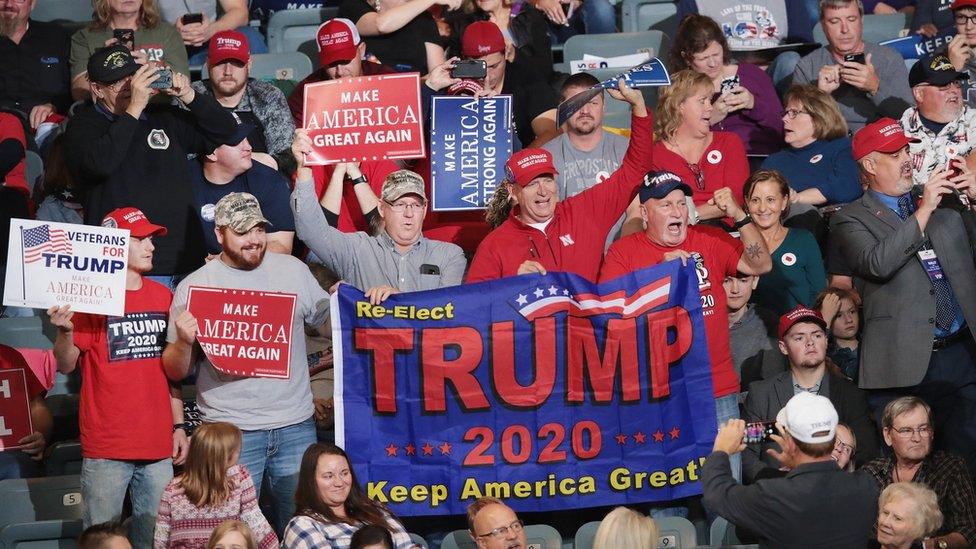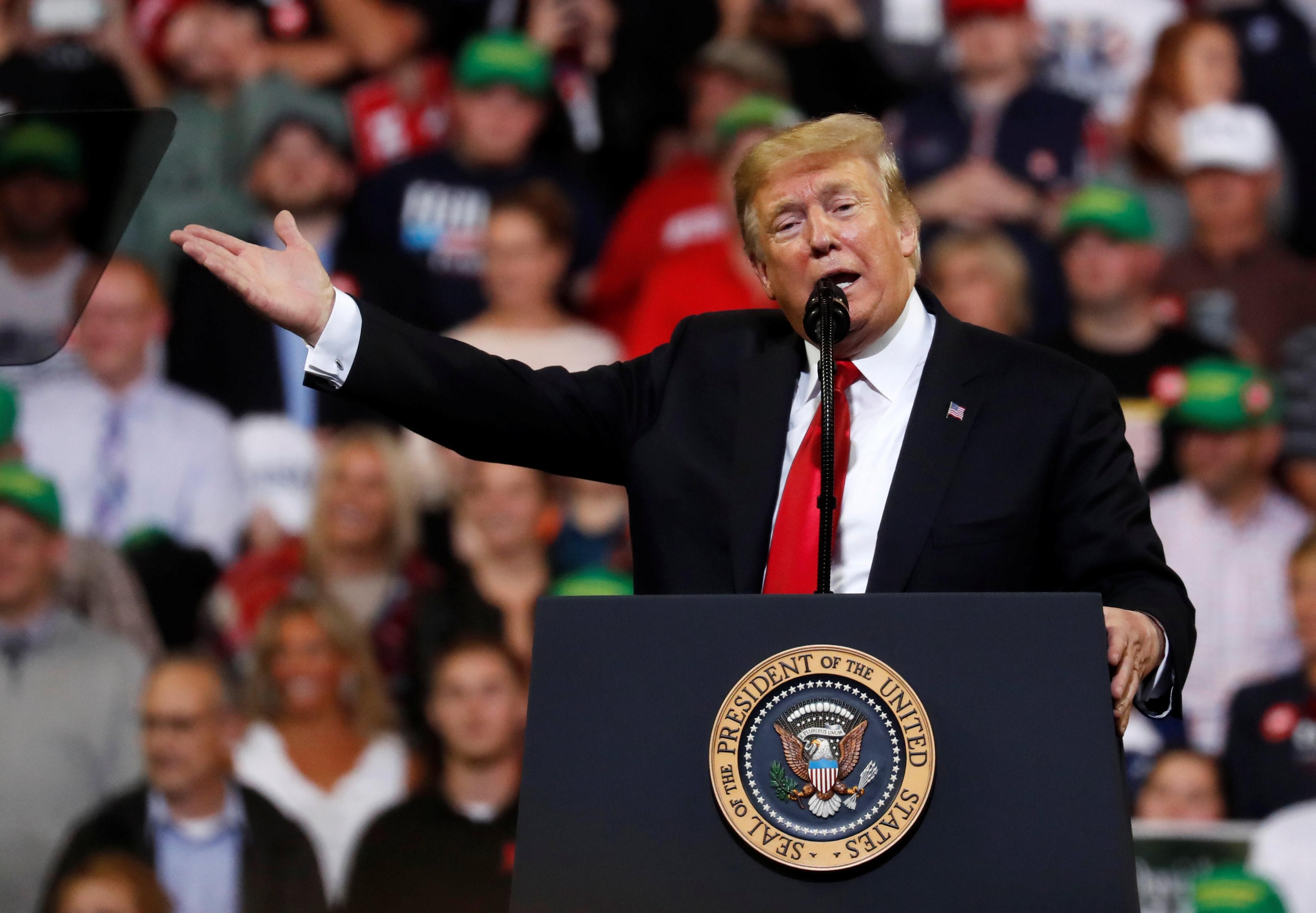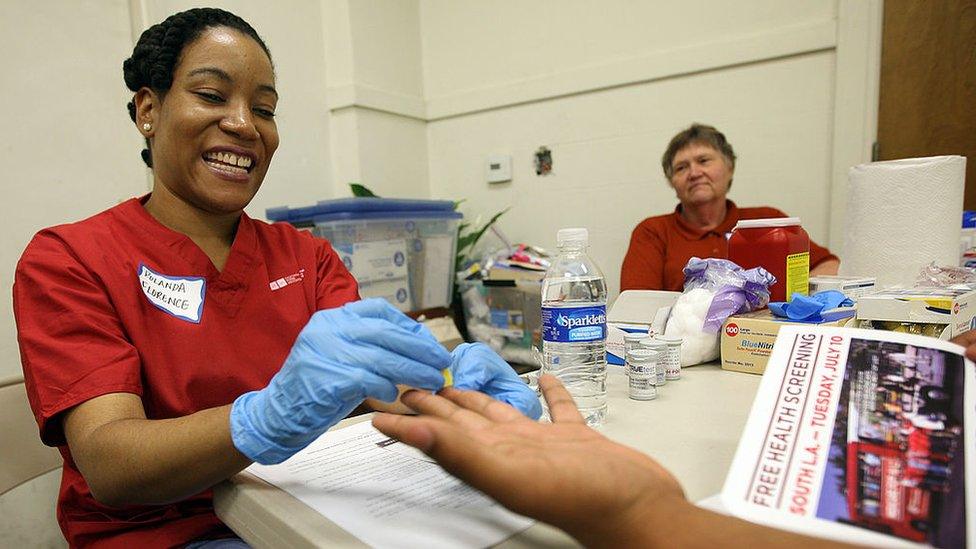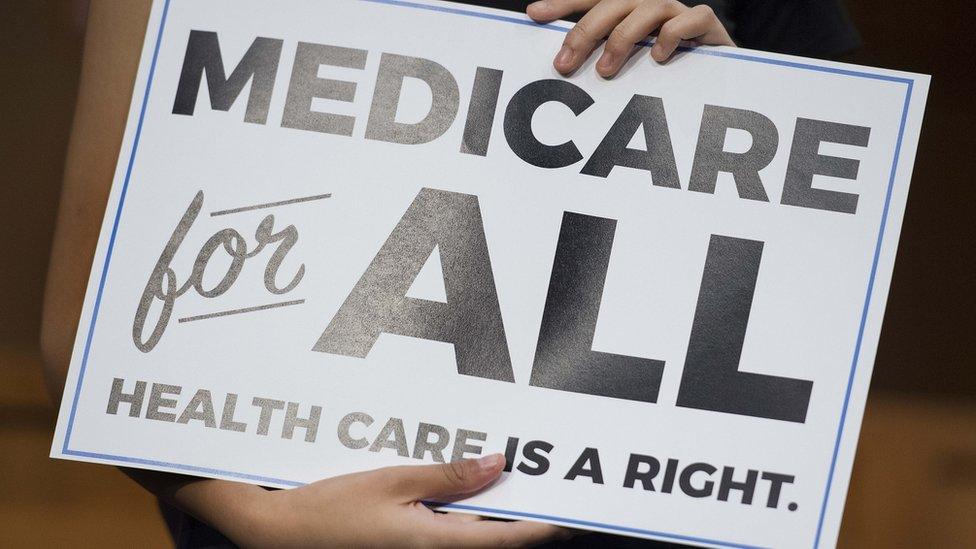Why Trump’s slamming Medicare for all as 'socialist' healthcare
- Published

Healthcare is becoming an issue for the mid-term elections next month
A rare opinion piece from President Trump on US healthcare and "open-borders socialism" has caused controversy. What's the White House strategy?
Donald Trump didn't write anything that he hasn't said at campaign rallies over the past few weeks.
But making those allegations in a major American newspaper like USA Today, external raises the attacks to a dramatic new level for a US president.
Conservative warnings of socialist plots by Democrats are nothing new, of course.
In 1961 Ronald Reagan, then a Hollywood actor and right-wing activist, accused the Democrats who created Medicare - the government-managed healthcare programme for the elderly - of waging an incremental effort to turn the US into a freedom-crushing socialist state.
"One of the traditional methods of imposing statism or socialism on a people has been by way of medicine," Reagan said. "It's very easy to disguise a medical program as a humanitarian project."
Barry Goldwater, the 1964 Republican presidential nominee, echoed similar sentiments.
"Having given our pensioners their medical care in kind, why not food baskets, why not public housing accommodations, why not vacation resorts, why not a ration of cigarettes for those who smoke and of beer for those who drink?" he asked.
During the 1965 debate over Medicare and Medicaid - a government-run healthcare system for the poor - Republican Senator Carl Curtis called the proposals "brazen socialism", which set the nation on course "from which there will be no turning back".
Now, a half-century later, Mr Trump says he's defending Medicare - which has become one of the most popular government-run programmes - against Democratic plans to destroy it by expanding its coverage to all Americans.
"If Democrats win control of Congress this November, we will come dangerously closer to socialism in America," Mr Trump writes. "Government-run healthcare is just the beginning."
The new divisive issue
It is, needless to say, an ironic twist.
The president also finds a way to work in his favourite topic, immigration, warning that "open-border Democrats" will allow undocumented migrants to flood into the nation for free healthcare, swamping medical centres and denying care to American taxpayers.
It's line of argument that fits in with the president's other warnings about what he views as the threat immigrants pose to public safety and the American economy.
That the newspaper essay focuses directly on healthcare, and Medicare expansion, is a clear acknowledgement that, despite the recent drama for the confirmation of his Supreme Court nominee Brett Kavanaugh, last year's tax cuts and the constant barrage of anti-immigration rhetoric, healthcare is shaping up to be a decisive issue in the upcoming elections.
Democrats are hammering issues of pre-existing medical condition coverage and rising insurance premiums in congressional races across the nation.

Other Republicans have brought fears of socialism into American campaigns - but not while they were presidents
Republican incumbents - particularly in the House of Representatives - took some unpopular votes last year on healthcare reform, leaving them vulnerable.
The Trump administration is backing a Republican lawsuit that challenges the legality of Obamacare's mandate that all insurance plans offer coverage for pre-existing conditions.
As is his style, the president's response is to go on the attack. His opinion piece focuses on the impact the proposed expansion of Medicare would have on the elderly - the group that currently enjoys the low-cost government healthcare programme and would be most wary of any changes.
They also vote in mid-term elections in the highest numbers by far.
In 2014, 55% of those aged 60 and over cast ballots, compared to just 30% of those between 30 and 44 and 16% of the 18-to-29 demographic.
It's a strategy that Democrats, in the past, have embraced as well. In 2012 a liberal advocacy group aired a television commercial warning that the Republican presidential ticket of Mitt Romney and Paul Ryan threatened healthcare for the elderly, external - illustrated with video of a grandmother in a wheelchair being pushed off a cliff.
Presidents typically try to stay above these kind of bare-knuckle attacks.
But Mr Trump, in case one needs reminding, thrives on being anything but traditional.
- Published20 September 2017

- Published13 September 2017

- Published11 July 2019
